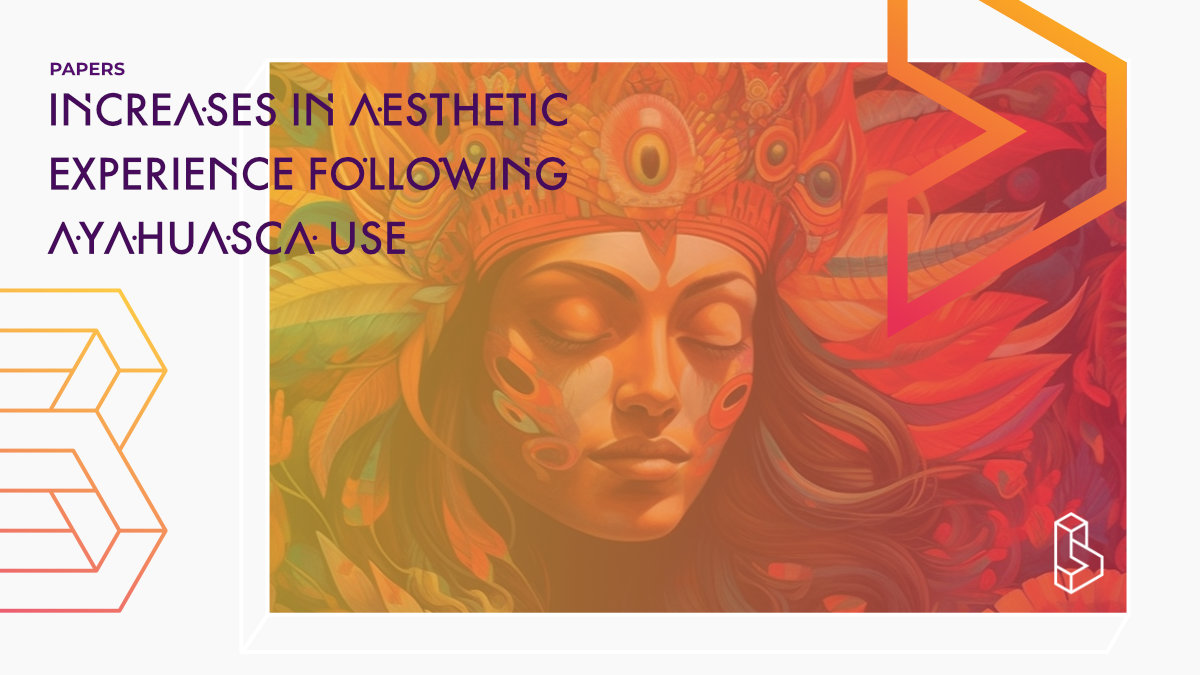This open-label longitudinal pre-print study (n=54) explores the impact of ayahuasca on aesthetic experiences, measured before and after attending an ayahuasca retreat. The findings suggest an increase in aesthetic experiences following the retreat, despite no correlation between measures of acute drug effects (e.g. intensity of the trip) and changes in aesthetic experience.
Abstract of Increases in aesthetic experience following ayahuasca use
“Psychedelic drugs are currently being investigated for their potential to facilitate a variety of long-lasting psychological changes. One area of psychological functioning that has yet to be systematically investigated in psychedelic research regards aesthetic experiences. This is surprising given the notable acute changes in perception induced by the drugs as well as the wealth of anecdotal reports of individuals reporting increased engagement in aesthetic experiences after psychedelic use. The current study was designed to address this gap in the literature by administering a validated measure of aesthetic experience one-week before, one-week after, and one-month after participants (N = 54) attended an ayahuasca retreat center. Participants also completed surveys indexing the extent to which they endorsed mystical-type experiences, awe, and ego dissolution during their ayahuasca sessions to identify potential predictors of long-term change. We found that compared to baseline, participants exhibited increased levels of aesthetic experience at both follow-ups. Measures of acute drug effects did not predict changes in aesthetic experience. Although the study was limited by an open-label design, the results support anecdotal reports regarding changes in aesthetic experience after psychedelic use and provide important groundwork for future study.”
Authors: Jacob Aday, Emily Bloesch, Alan K. Davis, Sarah Domoff, Kyle C. Scherr, Joshua Woolley & Christopher Davoli
Summary of Increases in aesthetic experience following ayahuasca use
Classic psychedelic drugs include 5-HT2AR agonists such as lysergic acid diethylamide (LSD), psilocybin, mescaline, and ayahuasca. The current study investigated the aesthetic components of psychedelic culture by administering a multifaceted measure of aesthetic experience to participants before and after they attended an ayahuasca retreat centre.
Ayahuasca is a hallucinogenic tea native to South America that contains oxidase inhibitors that prevent DMT from being oxidized and destroyed in the stomach. It has been associated with positive changes in emotion regulation, grief, creativity, mindfulness, executive functioning, substance misuse, anxiety, and depression. Ayahuasca and other psychedelics induce acute effects that may be important mediating factors in the long-term effects that have been documented. For example, mystical-type experiences and feelings of awe may predict long-term psychological changes.
Evidence suggests that psychedelic use may lead to changes in aesthetic experience. For example, Havelock Ellis noticed that he was more aesthetically sensitive after taking mescaline, and McGlothlin et al. (1967) found that high-dose LSD users reported an increased appreciation of art. A multifaceted measure of aesthetic experience was given to participants the week before, week after, and one month after attending an ayahuasca retreat in Costa Rica. It was also assessed whether participants endorsed feelings of awe, ego dissolution, and mystical-type experiences during their most intense ayahuasca session.
Find this paper
Increases in aesthetic experience following ayahuasca use: An open-label, naturalistic study
https://doi.org/10.1177/00221678241230609
Open Access | Google Scholar | Backup | 🕊
Cite this paper (APA)
Aday, J. S., Bloesch, E. K., Davis, A. K., Domoff, S. E., Scherr, K., Woolley, J. D., & Davoli, C. C. (2024). Increases in Aesthetic Experience Following Ayahuasca Use: A Prospective, Naturalistic Study. Journal of Humanistic Psychology, 00221678241230609.
Authors
Authors associated with this publication with profiles on Blossom
Jacob AdayJacob S. Aday is a Postdoctoral Researcher in the Department of Psychiatry at the University of California, San Francisco.

